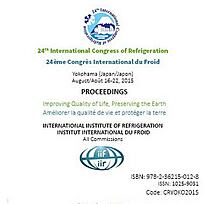
Document IIF
Critique de l'amélioration de la performance de refroidisseurs à air à refroidissement évaporatif.
Critique of improved performance of air-cooled chillers with evaporative cooling.
Numéro : pap. n. 76
Auteurs : YU F. W., CHAN K. T., YANG J., et al.
Résumé
This article examines how evaporative cooling helps improve the energy performance of air-cooled chillers installed in refrigeration and central air-conditioning systems. Precooling of condenser air for heat rejection can be done by direct evaporative coolers and mist generators. The refrigeration effect and coefficient of performance of the chillers can be enhanced in various degrees by the devices under different outdoor conditions. Mist generators are more preferable because of their flexibility in retrofitting in existing chillers, the negligible flow resistance by mist and higher cooling effectiveness with limited water use. A higher difference between the dry bulb and wet bulb temperatures in future climates would call for a wider application of evaporative cooling for air-cooled chillers for sustainable development. Discussion has been given on how the mist generation rate should be regulated to complement condenser fan control. More research should be conducted to develop a mist nozzle layout to maximize cooling effectiveness while optimizing the control of condensing temperature for maximum performance.
Documents disponibles
Format PDF
Pages : 7 p.
Disponible
Prix public
20 €
Prix membre*
Gratuit
* meilleur tarif applicable selon le type d'adhésion (voir le détail des avantages des adhésions individuelles et collectives)
Détails
- Titre original : Critique of improved performance of air-cooled chillers with evaporative cooling.
- Identifiant de la fiche : 30015109
- Langues : Anglais
- Source : Proceedings of the 24th IIR International Congress of Refrigeration: Yokohama, Japan, August 16-22, 2015.
- Date d'édition : 16/08/2015
- DOI : http://dx.doi.org/10.18462/iir.icr.2015.0076
Liens
Voir d'autres communications du même compte rendu (657)
Voir le compte rendu de la conférence
-
Reduction of energy consumption in air-conditio...
- Auteurs : NDUKAIFE T. A., AGWU NNANNA A. G.
- Date : 11/07/2016
- Langues : Anglais
- Source : 2016 Purdue Conferences. 16th International Refrigeration and Air-Conditioning Conference at Purdue.
- Formats : PDF
Voir la fiche
-
Energy conservation on 1 TR split air condition...
- Auteurs : POKHRIYAL M., NARYANKHEDKAR K. G., ATREY M. D.
- Date : 21/08/2007
- Langues : Anglais
- Source : ICR 2007. Refrigeration Creates the Future. Proceedings of the 22nd IIR International Congress of Refrigeration.
- Formats : PDF
Voir la fiche
-
Electrochemical cooling water treatment: a new ...
- Auteurs : BECKER H. A., COHEN J. J., ZDUNEK A. D.
- Date : 25/01/2009
- Langues : Anglais
- Source : ASHRAE Transactions. Papers presented at the 2009 ASHRAE Winter Conference: Chicago, Illinois, January 2009. Volume 115, part 1.
Voir la fiche
-
Sistemi di gestione dello sbrinamento.
- Auteurs : LAMANNA B.
- Date : 29/06/2001
- Langues : Italien
- Source : Le ultime tecnologie del freddo e del condizionamento./ Latest technologies in refrigeration and air conditioning.
Voir la fiche
-
Promena parametara vlaznog vazduha u orosavajuc...
- Auteurs : VUCKOVIC G., ILIC G., VUKIC M., et al.
- Date : 02/11/2005
- Langues : Serbe
- Source : Zbornik radova pisanih za 36. kongres o klimatizaciji, grejanju, hladenju + CD-ROM./ Proceedings of the 36th International HVAC&R congress + CD-ROM.
Voir la fiche
